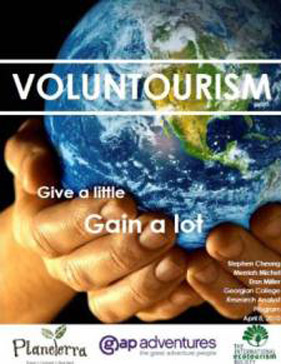Voluntourism means big benefits for visionary destinations

How can destinations access the volunteer tourism market?
Volunteer tourism is a growing market, valued at over a billion pounds and can offer many benefits to a destination. Volunteers contribute directly to local communities, bringing much needed skills or just an extra pair of hands.
They can help get local projects off the ground and add capacity to small organisations. They will stay in locally owned accommodation and spend money in local businesses, bringing economic benefits.
Volunteers often give a long term commitment to a local community. The cultural exchange between the volunteer and local people leads to a connection being established and volunteers often continue to support the community or local organisation where they volunteered by raising funds and returning to visit time and time again. The value of this kind of tourism cannot be underestimated.
If destinations want to access this market, it is important they start by looking carefully at where volunteers can benefit their local communities and environment. By its very nature, this kind of tourism needs to be developed from the bottom up, at grass-roots level. The first step is therefore to work with the local community to assess whether there are projects which could benefit from volunteers and establish the type of volunteer tourism which would have the most impact for the destination. There are many models of volunteering so a good starting point would be to research what is already out there, especially in similar destinations.
Destinations need to ensure that they have the local capacity to manage volunteer tourism projects. It is often community-based organisations or NGOs within destinations who are central to setting up and managing volunteer tourism, so destinations will need to work closely with these local partners. In addition, a long term approach is required to ensure projects are sustainable.
Time needs to be taken to develop volunteer placements and identify the kind of skills required from a volunteer and the role they will be doing. Questions to ask include what activities can volunteers do; how many volunteers and what duration should placements be; how much support and training will they need; how will they get to the project and where will they stay; who will manage the projects; what resources and people are needed to manage volunteers; what training will local people need; how will projects be assessed and monitored; what is the cost of hosting a volunteer, the fee to charge and what it will cover.
The next step is to explore the marketplace and ensure it is realistic to attract volunteers to the destination. If a community decides they need highly skilled volunteers, this could limit the success of the project. Volunteers don’t necessarily need specialist skills for some projects but in some contexts, like childcare or education, a volunteer with previous experience would bring a lot more to a project than a school leaver on their gap year. However for conservation projects which largely involve hands on work and data collection, no specialist skills are required.
So how can locally managed organisations attract volunteer tourism to their projects?
Registering with an agency
One approach is to promote projects through an intermediary agency. Ecoteer is one such agency who have effectively removed the middleman and allow organisations to access volunteers for free. They don’t charge local organisations to list projects on their website and require two volunteer references to validate the project. Volunteers can search for placements, view ratings from previous volunteers and contact the project directly. Any costs are paid directly by the volunteer to the local organisation.
Partnering with a volunteer-sending organisation
A local project could also consider approaching volunteer-sending organisations in the originating markets. Some volunteer tourists will prefer to arrange their trip with an established operator, who can arrange the whole package and give assurances around security and financial protection. These organisations work with local partners and many of them are not-for-profits which means that a higher proportion of the volunteer’s payment will go to the project. Working with these kind of organisations gives projects exposure and marketing but they will also benefit from the preparation and logistical support provided by the organisation.
Marketing
Attracting volunteers through marketing activity can be a challenge for a small organisation with minimal resources based in a remote location. One possible solution to this is that an organisation could look for a volunteer with marketing experience to come and help to promote the project, or someone who can improve the organisation’s web presence. Another opportunity is for destination marketing organisations to promote volunteer tourism projects through their websites and communications. Including volunteer tourism can really show a different side of a destination and demonstrate the diversity of tourism options on offer.
Spread the word
Word of mouth and reputation are also excellent ways for an independent organisation to attract volunteers. Most people will put considerable time and effort into researching volunteering options. There are many review websites out there (for example abroadreviews.com ) so one way for local organisations to market themselves successfully is to encourage volunteers to post reviews about their experiences. There are also lots of advisory websites for people considering volunteering, for example gapyear.com. These sites include stories and articles, so asking volunteers to write about their experience for these kind of sites will gain more publicity for projects. Testimonials written by volunteers on the organisation’s own website are also key information for a volunteer researching which project to choose.
Ensure a high quality experience for volunteers
The power of online reviews and forums in informing consumer decision-making shouldn’t be underestimated. Organisations need to offer good placements which are well-structured, especially for shorter visits. Ensuring that volunteers are given a good amount of briefing information before they sign up to a project and are provided with an induction and training when they arrive will enhance their experience significantly. Giving good support to a volunteer during their placement will also add to the reputation of the project. By offering a high quality experience to volunteers, an organisation will benefit from positive reviews and recommendations.
Offer diverse products
One final way that local organisations can access the volunteer tourism market is through offering a diverse range of products. By developing community-based tourism, for example ecotours, village visits or home-stays, they could generate more visitors and increase awareness of the projects. A tourist could visit a local community and form a strong connection, which may lead them to return as a volunteer on their next holiday. A great example of a locally run organisation doing just this is Andaman Discoveries. They are a community-based tourism organisation in Southern Thailand offering a mixture of village experiences, volunteering projects and regional tours. All the activities and projects are designed and managed by the local community and profits go back into a community fund. Another organisation offering a range of experiences is CREES Expeditions, with a mixture of conservation volunteering projects, expeditions and rainforest tours in Manu Biosphere Reserve in Peru.
There is clearly the opportunity for destinations to benefit from the volunteer tourism market. However, this isn’t a straightforward market and unfortunately there are lots of examples of volunteer tourism projects which started with the best of intentions but had negative outcomes for both local communities and volunteers. Some of the potential issues that could arise are communities not fully participating in decision-making and therefore not supporting volunteer tourism initiatives or welcoming volunteers; projects not being attractive to volunteers or requiring very specific skill-sets; not planning the logistics for volunteers, for example how they will get to the projects, where they will stay and eat; destinations not allocating resources to projects or people to manage volunteers, and not providing training to communities who will host volunteers.
One final and important issue around destinations setting up volunteer tourism projects in their communities is that they may not be able to vet volunteers or assess their motivations. This does carry a significant risk, especially for projects where volunteers have direct contact with children and vulnerable people.
Although there are potential issues with this market, there are many successful volunteer tourism initiatives around the world and with planning, community involvement and well structured projects, destinations can use this movement to bring positive impacts to their communities.
Natasha Stein
Natasha Stein has worked for VSO, Earthwatch and Thomson Holidays and specialises in best practice in overseas volunteering programmes and identifying the right placements for volunteers. Natasha developed an interest in responsible tourism whilst working at Thomson Holidays as a Product Manager for long-haul destinations. After 6 years with VSO’s volunteering team, she decided to combine her experience in tour operations and international development and pursue a career in responsible travel. She is currently studying for a Masters in Responsible Tourism Management at the International Centre for Responsible Tourism.
Email: natashakstein@gmail.com
Blog http://responsiblevolunteering.wordpress.com/
Sustainable tourism info Special Offers HERE
 United Kingdom
United Kingdom United States
United States Asia Pacific
Asia Pacific












































CLIA expands trade support with expedition event
Qatar Airways adding Manchester flights
Jet2 unveils Samos as new Greek destination for summer 2026
EU entry-exit system delayed again
ATC strike in Greece could disrupt flights this week